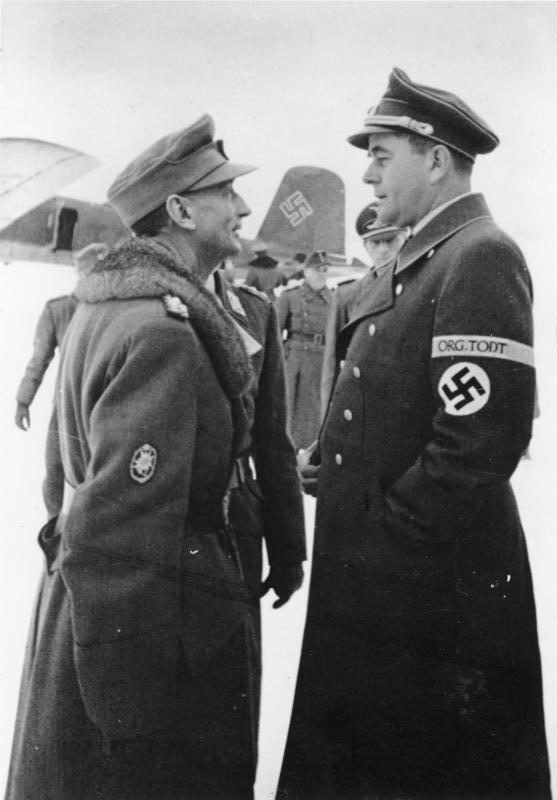B - The Occupation Regime: Ambitions and Responses
The main aim of this WP is to develop a comprehensive understanding of the occupation regime in Norway – both its intentions, institutions and projects. In studying how it actually functioned, it will further be possible to explain the reactions of different groups in Norwegian society in the various grey zones between ideological collaboration and resistance.
This WP can build on a recent research project into the use of forced labour in Norway, led by Hans Otto Frøland, which has made it possible to draw comparisons between the economic history of the occupation in Norway and other countries.Leading postwar historians tended to highlight the ways in which the occupation regime overrode Norwegian interests. Subsequent studies by Alan Milward and Robert Bohn were more concerned with (conflicting) German ambitions and comparative dimensions. Most recently, the planned nazification of the public sector, the aims of the SS and Organisation Todt have all been studied by Norwegian historians. WP B takes as its point of departure the substantial scholarly literature on the polycratic nature of the Nazi state. So far, this model has primarily been used to explain developments within Germany and has not been applied to the occupation regimes.
B1: “Polycracy and Common Interests in the German Occupation Regime: Studies of Cooperation and Conflict between Wehrmacht, Reich Commissariat, SS and OT”
Postdoctoral fellowship
This subproject will be conducted within the framework of a postdoctoral fellowship, funded by the project, and announced internationally. The fellowship will be based at NTNU, and will result in two peer-reviewed articles.
B2: “The Costs of Occupation and the Question of Reparations: Discussions between German and Norwegian Authorities”
Hans Otto Frøland, Adjunct Professor at UiT
The project will seek to identify the funding streams behind the activities of the occupation authorities during the occupation, and the discussion of occupation costs between Norwegian and German authorities, as well as among the German agencies, after 1945. The study will result in one peer-reviewed article.
B3 and B4: “Keeping the Wheels Turning? Economic Responses to the German Occupation”
Associate Professor Anette Storeide and Associate Professor Bjørn-Petter Finstad)
The two sub-projects will deal with economic collaboration. This subject attracted only marginal interest in Norwegian historical research until the late 1980s. However, in recent decades several studies have shown that the occupation created business opportunities for Norwegian enterprises, which they exploited in accordance with their own, sometimes far-reaching strategic goals. Sub-project B3 (Storeide) aims to present a systematic multi-sectoral synthesis of Norwegian industry between 1940 and 1945, based on the extensive research that has been carried out in recent years, as well as relevant archival material. Sub-project B4 (Finstad) will present an in-depth analysis of the Norwegian fishing industry. Apart from presenting original research on Norway, the sub-projects have the additional ambition of developing more productive conceptual frameworks for the analysis of economic collaboration. This work will build on an ongoing project at NTNU. The sub-projects will result in two peer-reviewed articles.
B5: “The Military Courts of the Wehrmacht”
Associate Professor Maria Fritsche (NTNU)
This subproject will investigate another central aspect of the occupation regime, i.e. the German military justice system in occupied Norway. In recent years, a range of studies has revealed the important role of the Wehrmacht and its military courts in implementing Nazi policies and enforcing consent among both the German military and civilians in the occupied territories. The Wehrmacht Feldgerichte and Reichskriegsgericht conducted ten times more criminal proceedings against civilians in Norway in 1942 than the newly established SS- and Polizeigerichte. The project will analyse court documents to establish how the Germans transferred legal, ideological, moral and gender norms to a Norwegian setting; to identify the strategies applied to produce consent; and to shed light on the complex relations between Norwegian civilians and German military personnel. The work will result in a peer-reviewed article.
Externally funded subprojects
B6: “Organisation Todt and the German Construction Industry in Norway: Its Relations with the Norwegian Construction Industry”.
B7: “Organisation Todt in Finland and its Retreat into Norway in 1944: The Impact on Northern Norway”
Both of these projects are ongoing as well as related to the work package and will result in a peer-reviewed article.
